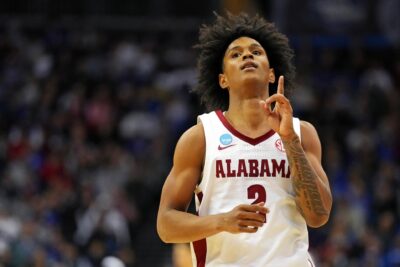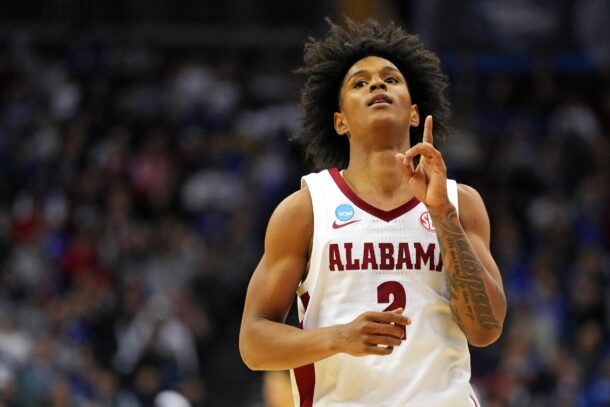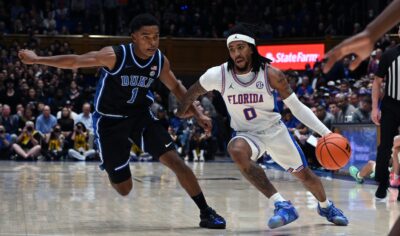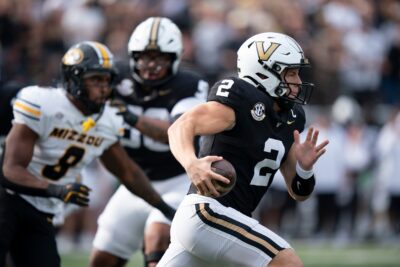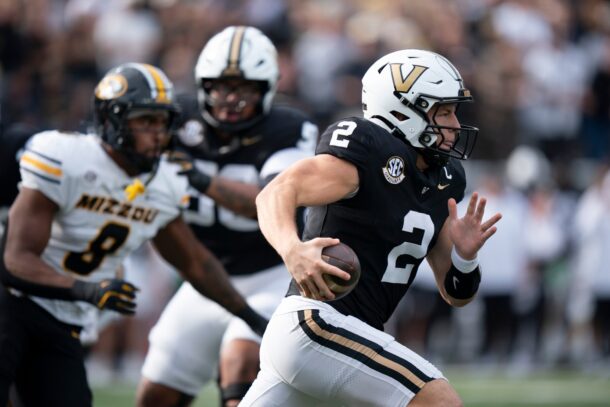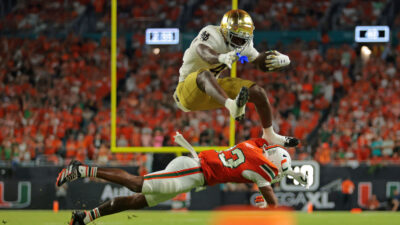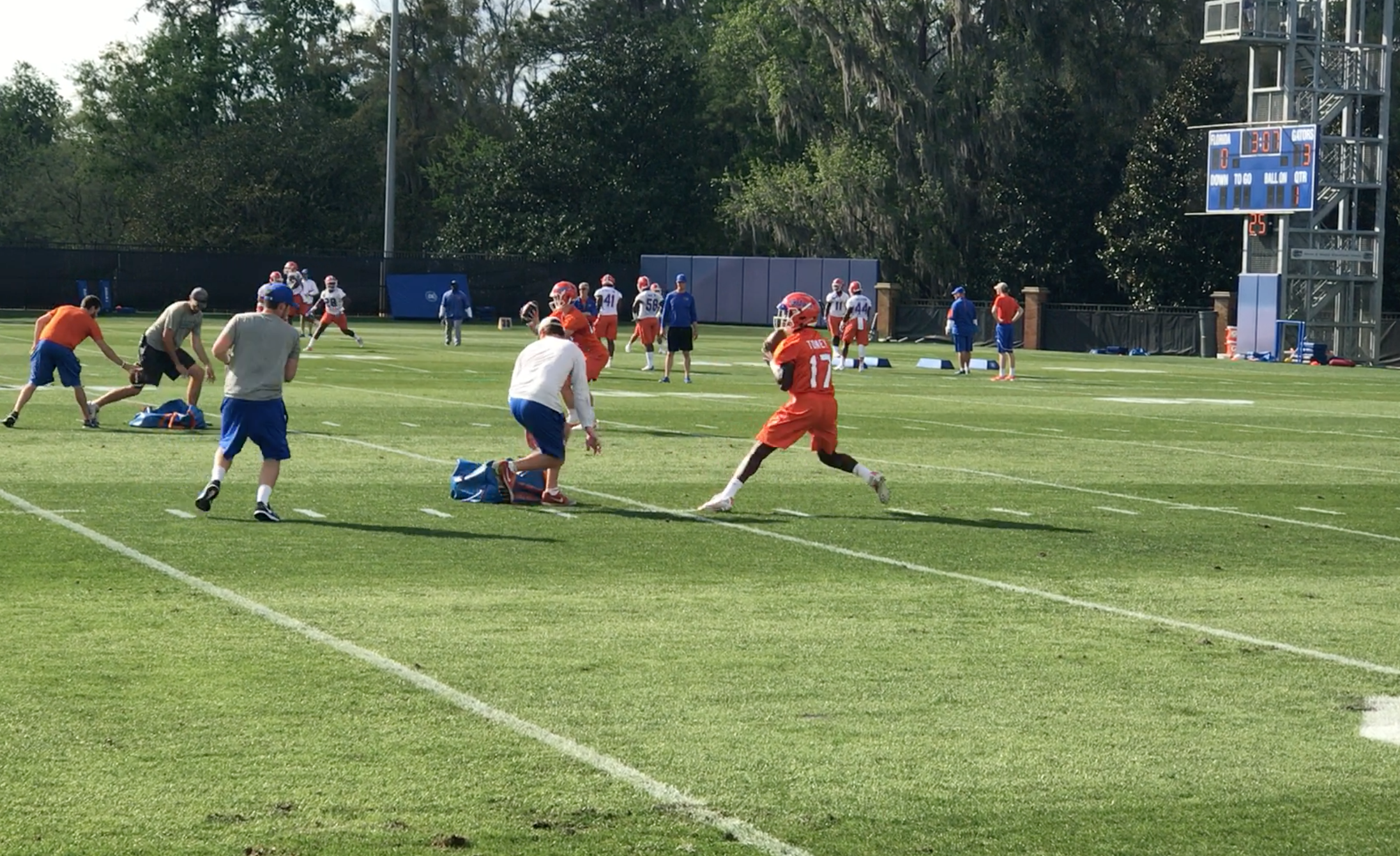
The other QB: Gators look to ‘electric’ freshman to spark offense
By Andrew Olson
Published:
GAINESVILLE, Fla. – As soon as the Outback Bowl ended, the discussion surrounding next year’s Gators became about two players: Feleipe Franks and Kyle Trask. The 2016 quarterback signees redshirted last fall, and are now locked in the squad’s most high-profile position battle. While the starting quarterback will likely be one of the two, coach Jim McElwain revealed that he’s hoping another quarterback will spark the team: Kadarius Toney.
The early enrollee out of Eight Mile, Ala., was far from a marquee signee in Florida’s 2017 recruiting class. Toney was rated a 3-star athlete, meaning he showed potential at multiple positions. The 247Sports Composite listed him as the No. 418 overall recruit, No. 24 athlete and No. 20 Alabama product in the class. The lack of a blue-chip rating didn’t stop offensive coordinator Doug Nussmeier from being impressed with what he saw.
“When you evaluate film, and you see a guy like that, when the ball gets in his hands, and see that every time he touches the ball, something good happens for his team. When you look at a guy like that, you say, ‘Where can he play?’ Well, he can play multiple positions,” Nussmeier said. “What does he do with the ball in his hands? He can throw. He can play without the ball in his hands, he’s done that before. There’s a lot of different elements, like I said, that he provides to you as an offense.”
When Toney, listed at 5-11, 180 pounds, committed on May 4 of last year, many predicted he would line up at wide receiver. When it was announced on Jan. 19 that Luke Del Rio would miss spring practice, it became clear that Toney, who had enrolled earlier in the month, would be getting reps at quarterback. Those reps have quickly become about more than having a third-stringer on the depth chart.
“I think there’s going to be some things we’re going to be able to do with (Toney) in some package, a lot like we were doing with Dre (Massey) a little bit, only more so that he really has been a quarterback,” McElwain said. “He pulled one down and took one very quickly to the end zone from a ways away and caught the eyes of not only us as coaches but the team.”
On the surface, the comparison to Massey might not seem significant. Massey, a junior college wide receiver transfer, only played in half of one game in 2016, the season opener against UMass, before leaving with a torn ACL. The speedy wideout did it all in high school – passing, running, catching and even punting – and was supposed to be a big part of the Gators’ offense. When he went down with the torn ACL, McElwain and Nussmeier had to scrap a package of plays they were counting on using.
Nussmeier thinks a Toney package will give defenses more to worry about when it comes to preparing for the Gators.
“He’s electric. You know, when you put the ball in his hands, he can make things happen,” Nussmeier said. “He had a run the other practice, and he had one again today, when he pulls it down and goes, you better bottle him up fast because he’s electric, and we’re really excited about him.
“He brings a whole ‘nother dimension to our offense, the ability to put some packages in and do some things differently. It takes you out of ‘Hey, this is what they’re going to be in.’ Now, there’s a whole new package that presents itself to a defense (that) they’ve got to prepare for week in, week out.”
Florida’s offense desperately needs a spark. The Gators ranked No. 116 nationally in total offense last year with only 344 yards per game. Adding insult to injury, they came in one below South Carolina, coached by Will Muschamp, whom Gators fans frequently criticized for lack of offense during his four seasons in Gainesville. Rushing offense wasn’t much better, as 128.2 yards per game on the ground put UF at No. 113 nationally.
During his two seasons with the Gators, McElwain hasn’t used a wildcat-type package. In 2015, the Gators had only two scholarship quarterbacks available in the second half of the season, Treon Harris and Josh Grady, a wide receiver transfer from Vanderbilt. Last season, the four scholarship quarterbacks (Austin Appleby, Del Rio, Franks, Trask) were all pocket-passers – though Appleby had a few runs off the zone read – showing why the coaches turned to Massey for the wildcat package (or Gator Tail as it was called with Grady). It fit with McElwain’s long history of coming up with packages to snap the ball directly to a speedster.
McElwain said Tuesday that it goes all the way back to his time at Eastern Washington, where he was a quarterbacks and wide receivers coach from 1987-94. He’s used it at many other stops along the way.
“When we were at Louisville, we had thing for Stefan LeFors, with him and (Dave Ragone). At Michigan State, with Drew Stanton, when he was kind of the backup we did some things, too. It’s kind of been a little bit of everywhere, and we didn’t do it with a quarterback-type when I was at Alabama. We did it with (Mark) Ingram and (Trent) Richardson and Eddie (Lacy).
“We did it with a true kind of running back where the pass threat wasn’t there. We did it a little bit with Marquis Maze who was a wideout, but was a high school quarterback. We had some things that we did with him when we were there. We’ve used it kind of a little bit of everywhere we’ve been.”
If McElwain could get Florida’s offense to look like what he ran at Alabama from 2008-11, the Gators may be ready to take the next step.
Andrew writes about sports to fund his love of live music and collection of concert posters. He strongly endorses the Hall of Fame campaigns of Fred Taylor and Andruw Jones.


